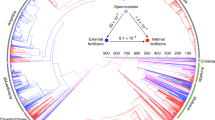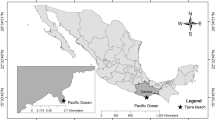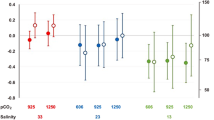Abstract
THE evolution of egg and sperm1,2, and more derived forms of sexual dimorphism, is thought to be driven by sperm competition and postzygotic survival; males are limited by fertilizations, females by resources3. Evidence of sperm competition comes from internal fertilizers, or cases where sperm are deposited on eggs4, but in free-spawners, the ancestral mating strategy (refs 1,5 but see ref. 6), females are often sperm limited7,8. Laboratory experiments on sea urchins demonstrate that intraspecific differences in gamete attributes, such as egg size, can influence rates of fertilization. Field experiments in which gametes are released and recaptured demonstrate that the influence of gamete traits on fertilization is not overwhelmed by sea conditions, and that variation in gamete traits can have important fitness consequences. These results suggest a new mechanism for the evolution of anisogamy and sexual dimorphism, in which sperm limitation is important, and natural selection for enhanced fertilization acts on females as well as males.
This is a preview of subscription content, access via your institution
Access options
Subscribe to this journal
Receive 51 print issues and online access
$199.00 per year
only $3.90 per issue
Buy this article
- Purchase on Springer Link
- Instant access to full article PDF
Prices may be subject to local taxes which are calculated during checkout
Similar content being viewed by others
References
Parker, G. A. in Sperm Competition and the Evolution of Animal Mating Systems (ed. Smith, R. L.) 1–59 (Academic, New York, 1984).
Maynard Smith, J. & Szathmary, E. The Major Transitions in Evolution (W. H. Freeman, Oxford, 1995).
Bateman, A. J. Heredity 2, 349–368 (1948).
Arnold, S. J. Am. Nat. 144, S126–S149 (1994).
Wray, G. A. in Ecology of Marine Invertebrate Larvae (ed. McEdward, L.) 412–448 (CRC, Boca Raton, FL, 1995).
Rouse, R. & Fitzhugh, K. Zool. Scripta 23, 271–312 (1994).
Levitan, D. R. in Ecology of Marine Invertebrate Larvae (ed. McEdward, L.) 123–156 (CRC, Boca Raton, FL, 1995).
Levitan, D. R. & Petersen, C. Trends Ecol. Evol. 10, 228–231 (1995).
Levitan, D. R. Am. Nat. 141, 517–536 (1993).
Benzie, J. A. H. & Dixie, P. Biol. Bull. 186, 153–167 (1994).
Denny, M. W. & Shibata, M. F. Am. Nat. 134, 859–889 (1989).
Vance, R. R. Am. Nat. 107, 339–352 (1973).
Smith, C. C. & Fretwell, S. D. Am. Nat. 108, 499–506 (1974).
Levitan, D. R. Am. Nat. 148, 174–188 (1996).
Scudo, F. M. Evolution 21, 285–291 (1967).
Vogel, H., Czihak, G., Chang, P. & Wolf, W. Math. Biosci. 58, 189–216 (1982).
Mundy, C. N. et al. Biol. Bull. 186, 168–171 (1994).
Rumrill, S. S. Ophelia 32, 163–198 (1990).
Author information
Authors and Affiliations
Rights and permissions
About this article
Cite this article
Levitan, D. Effects of gamete traits on fertilization in the sea and the evolution of sexual dimorphism. Nature 382, 153–155 (1996). https://doi.org/10.1038/382153a0
Received:
Accepted:
Issue Date:
DOI: https://doi.org/10.1038/382153a0
This article is cited by
-
Sperm motility of oysters from distinct populations differs in response to ocean acidification and freshening
Scientific Reports (2019)
-
Variation of sperm morphology in Pacific oyster precludes its use as a species marker but enables intraspecific geo-authentification and aquatic monitoring
Helgoland Marine Research (2018)
-
Fluorescent sperm offer a method for tracking the real-time success of ejaculates when they compete to fertilise eggs
Scientific Reports (2016)
-
Eggs with larger accessory structures are more likely to be fertilized in both low and high sperm concentrations in Styela plicata (Ascidiaceae)
Marine Biology (2015)
-
Multiple spawning events and sexual reproduction in the octocoral Sarcophyton elegans (Cnidaria: Alcyonacea) on Lizard Island, Great Barrier Reef
Marine Biology (2010)
Comments
By submitting a comment you agree to abide by our Terms and Community Guidelines. If you find something abusive or that does not comply with our terms or guidelines please flag it as inappropriate.



